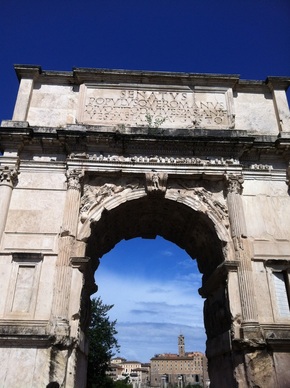 The Arch of Titus in Rome
The Arch of Titus in Rome The main information on this period comes from ancient reports, mainly the one of Josephus the priest (37-100ad), a Jewish general captured by Vespasian in 68ad who wrote ‘the Jewish war’.
In May 66ad the roman governor in Judea - Gessius Florius- sent his troops to Jerusalem’s upper market with instructions to kill everyone. The deaths were 3600: men, women and children.
The governor demanded the Jews to demonstrate their submission by greeting 2 cohorts entering Jerusalem, as the Jews rebelled the consequence was terrible.
At that time in Jerusalem there was a moderate party of the Jews led by Agrippa II (27-93ad), great grandson of Herod the great (73-4bc) appointed by the Romans. They attempted to cease the protest with no luck.
The Jews were divided into the war party and the peace party.
The priest Eleazar, captain of the temple, forbidden sacrifice paid by strangers thus impeding the longstanding custom of demonstrating loyalty by making offers to the temple on behalf of the emperor and Rome.
According to Josephus, our main source of information, 'this action laid the foundation of the war with Rome'.



